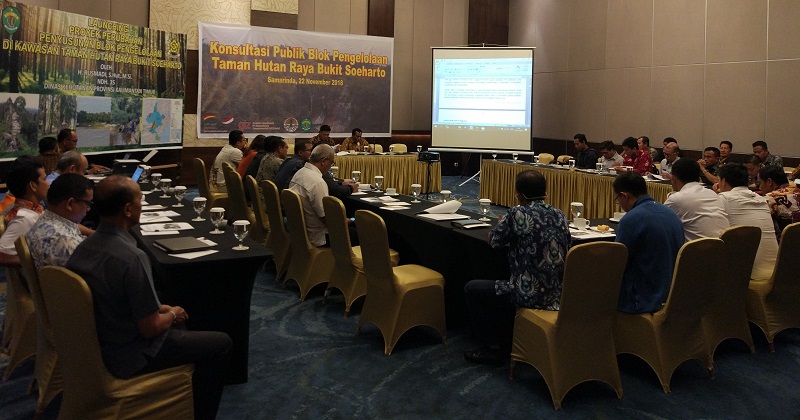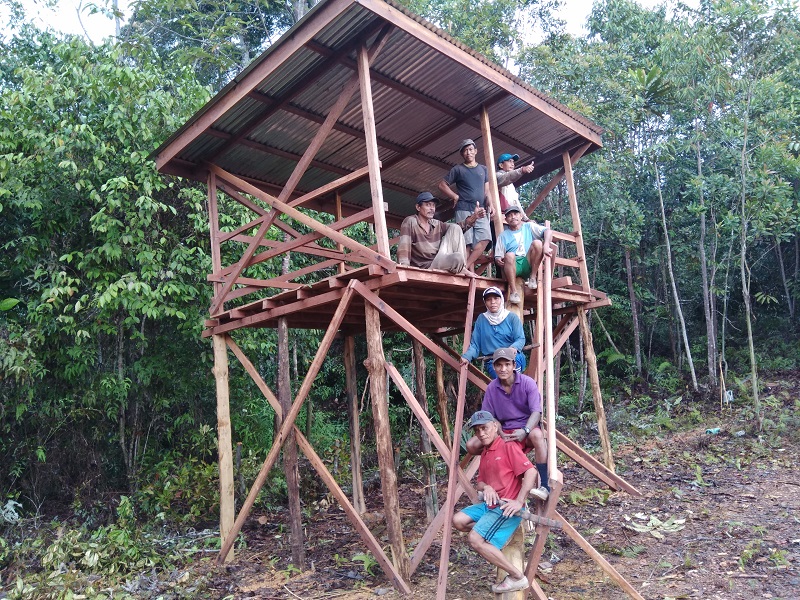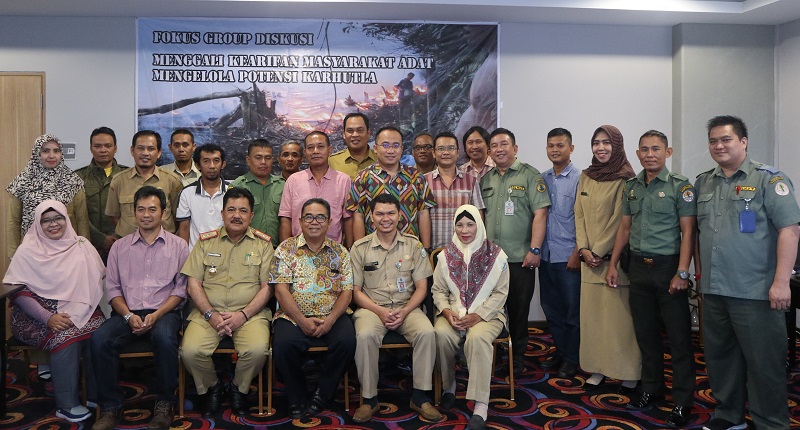FORCLIME
Forests and Climate Change ProgrammeTechnical Cooperation (TC Module)

Select your language

Aiming to protect and implement a better management of forest areas in the Bukit Soeharto Grand Park (Tahura) in East Kalimantan, the management of Tahura Bukit Soeharto conducted a public consultation on developing management compartments within Tahura on 22 November in Samarinda, East Kalimantan. The Tahura covers 64,814.98 hectares (based on the Minister of Environment and Forestry Decree No. 1231 of 2017) and is administerred under two districts: Kutai Kartanegara and Penajam Paser Utara. The development of management compartments, prepared by the Tahura administration and supported by GIZ, based on the Minister of Environment and Forestry decree (P.76/Menlhk-Setjen/2015 and P.11/KSDAE/SET/KSA.0/9/2016). Expectation from this public consultation is that relevant stakeholders will provide input aiming to protect and sustainable forest management of the Bukit Soeharto Grand Park
For more information, please contact:
Tunggul Butarbutar, Province Coordinator East Kalimantan
Suprianto, Technical Adviser, Sustainable Forest Management
Wandojo Siswanto, Strategic Area Manager, Forest and Climate Change Policies

To encourage sustainable forest management FORCLIME has facilitated an effort of the Village Forest Management Institution (Lembaga Pengelola Hutan Desa - LPHD) of Menua Sadap Village to strengthen the capacity in utilizing the existing potential. On this occasion the opportunity was taken to combine education on environmental issues with improving attractiveness for ecotourism. The activity was implemented on 19 to 23 November 2018 by involving both representatives of the LPHD and the community in Karangan Bunut, Menua Sadap village, Kapuas Hulu District, West Kalimantan. As many as 12 people were busy working 5 days creating a forest educational trail within a great forest landscape providing fun-based information about the forests for both tourists and local residents. This new attraction is seen as an ideal complement to the ecolodge, which has been operating for some time in direct proximity next to the Embaloh River.
Initially locations for a forest hiking trail, points of interest and a view point have been selected based on discussions with the local community. Eventually three trails with various types of plants, forest and river environment and locations of relevance including historical sites were prepared. One of the trails provides a small hut as a place to rest and enjoy the view over the forest, sign boards indicating botanic and local names of several plants including their use and benefits based on local knowledge. In addition, visitors are pointed to other interesting facts like animals’ pathways, orangutan nests, small water fall and protected birds.
During this activity, the representatives of the community involved showed a very high commitment to work and improvement of facilities. At the same time, they understood the importance of forest functions and benefits of village forests for future economic developments.
For more details, please contact:
Petrus Derani, Technical Advisor for Community Based Forest Management (CBFM)
Lutz Hofheinz, Senior Adviser for Forest Management Unit

The West Kalimantan Provincial Forestry Service held a discussion with its partners on 13 November in Pontianak to explore customary peoples' wisdom in preventing forest and land fires. The meeting aims to document the local wisdom in managing natural resources based on their knowledge and experience inherited from their ancestors. 25 participants attended the meeting representing government agencies (forestry service, forest fire fighters, forestry and agricultural extensions), academics and environmental NGOs in West Kalimantan (AMAN, Walhi, Pancur Kasih, INTAN Institute). The discussion that was lead by the Forestry Service Office of West Kalimantan Province was supported by FORCLIME.
Important take-aways from the meeting are the following:
1. Customary people have knowledge and wisdom in managing agricultural land, which take the risks of forest and land fires into account;
2. Documentation of local wisdom and knowledge related to managing forest fire risks is needed;
3. Developing a regulation on managing fires that adopts local wisdom of customary people is needed. Using the Regulatory Impact Assessment (RIA) methodology to identify policy needs at all levels is recommended;
4. Some sub-districts in West Kalimantan have mechanisms for reporting and monitoring land clearing by the community;
5. Developing an information and prevention monitoring system for forest fires that adopts best practices is needed.
For more information, please contact:
Jumtani, Coordinator West Kalimantan Province
Ronny Christianto, Integrated Fires Management Expert
 |
Supported By: |
  |